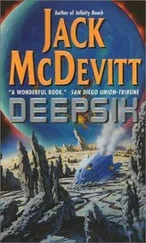“What do you mean?”
“What are the possibilities?”
“It’s probably a distress call.”
“That’s one possibility. What else might it be?”
She thought about it. “We just happened to be in front of it.”
“Good. So what do we do?”
“Find the source.”
“I believe,” said Benny, “I’ve been able to read enough to make a determination.”
“What have you got?”
“I can make out what appears to be Code Six .”
“Code Six,” said Jake. Help. “We haven’t used that one in a few years.”
To find the source of the signal, they had to get another angle. “Benny,” she said, “start engines. Prep for a jump. We want a seventy-degree angle on the transmission. Set for 30 million miles.”
“Starting engines, Hutch.”
The drive unit would require about forty minutes before they could actually do the transdimensional insertion. So she sat back to wait. “You ever run into anything like this before?” she asked Jake.
“Once,” he said. “But it was an automated vehicle. No life-and-death issue. I’ve never seen one where there was actually someone involved. Which is probably the case here.”
She brought up the signal. It was seriously corrupted. She couldn’t make anything out, but she had learned to trust the AI’s. “I wouldn’t want to get stuck out here,” she said.
“No, Hutch, me neither.”
There had been a few ships that had vanished over the years. Vehicles that simply went out somewhere and were never heard from again. It was, she supposed, inevitable. If you were going to travel to seriously remote places, you took your chances.
Jump technology was notoriously inexact. They emerged less than halfway to their intended destination.
“Are we still reading the transmission?” asked Hutch.
“Give me a minute.”
Meanwhile, Benny relayed a chart to the navigation display. He marked their initial position, and drew a line from it indicating the direction from which the transmission had come. He showed their current location and informed them that they weren’t receiving the transmission anymore.
“So either,” said Hutch, “we’ve gotten lost or it’s an intermittent signal.”
“Probably an intermittent signal,” said Jake. He brought some coffee back from the dispenser. “You want some?” he asked.
“No, thanks.”
“Sorry it’s taking so long,” said Benny. “It’s difficult to sort everything.”
“It’s okay, Benny. No hurry.”
It took about two days, but, in Jake’s words, they got lucky. “We’ve got something. It appears to be a shuttle.”
“They’re probably long dead,” said Hutch.
“That’s correct.” Jake’s voice was flat. “Maybe somebody got to them. Let’s hope.”
She wondered momentarily if the signal was a plant. Part of the exercise. If they were testing her judgment. “Benny,” she said, “do we have a record of any lost ships nine years ago?”
“The Forscher ,” he said. “It was last reported at Talios in the spring of ’86. Carrying an exobiologist and an actor. Started home and was never heard from again.”
An actor? Hutch’s heart rate began to pick up. “Jake, that would be Dave Simmons.” The ultimate action-hero vid star turned explorer. Simmons had turned out to be even bigger than the characters he portrayed. He’d financed scientific missions, founded schools in remote places, once famously challenged the African dictator Kali Anka to have it out man to man. Anka had declined and been driven from the country a year later.
“The exobiologist was Paul Trelawney,” said Benny. Trelawney had won the Cassimir Award in ’85. “And of course there would also have been a pilot.”
The ship had sent a movement report when it left Talios. A long search had yielded nothing. “So something happened on the way back,” said Hutch, “and they jumped out.” If they’d sent no hypercomm call, used only a standard radio, their chances of being found would have been virtually nil. There was simply too much ground to cover. But if they’d sent a hypercomm transmission, no one had received it.
It was hard to imagine the tall, lantern-jawed Simmons dead. The guy had been the epitome of the leading man, in charge, indestructible, always one step ahead of events. One entertainment commentator had remarked that his loss had “reminded us all of our mortality.”
“So what are you going to do?” asked Jake.
“We make a report and then head for Palomus, right? We can’t do anything for the Forscher , or whoever’s in the shuttle, not after all these years, so we just give the Patrol what we have and continue the mission.”
He nodded. “That’s by the book.”
She read disapproval in his eyes. Maybe another test of her judgment. “Jake, there’s no possibility here of anyone’s life being endangered. So we let the Patrol know and get back to what we’re supposed to be doing.”
“On the other hand,” he said—
“On the other hand, what?”
“We’re close. And our mission isn’t under time constraints. We can go have a look, and send back additional details.”
“Do we really want to do that?” Hutch was thinking about the shape the captain and his passengers would be in after nine years.
He straightened and looked down at her. “There’s a code, Priscilla. We owe it to them.”
“Okay.”
“We don’t leave people adrift out here if we can help it. It doesn’t matter what the book says. We go over to the shuttle and stand by until the Patrol comes.”
“Finding it was nothing short of a miracle,” said Hutch.
“There is more to it than that, Priscilla,” said Benny. “I was able to track it by fixing its position at several points over the few days during which it had been intermittently transmitting. That had given us direction and velocity. The rest had required some luck, but certainly not a miracle.”
Jake looked amused.
The shuttle was a Voltar II, an earlier model of the vehicle that rested inside the Copperhead’s own launch bay. It was adrift in a place where even the stars seemed dim.
“It explains why they had to use a radio,” said Hutch.
Jake nodded. “They had to abandon ship.”
It looked undamaged. Its registry number, VC112, brightened when the Copperhead’s navigation lights fell on it. It was, of course, silent now. Its ports were dark, although there was still enough power to cause a flicker in the fore and aft warning lamps as they drew near. Hutch turned her forward lights on the vehicle.
The pilot’s seat was occupied.
Jake climbed out of his harness and opened the storage bin. He took out a set of air tanks and the backpack that contained the Flickinger generator and a jetpack. Then he looked at her.
She had an obligation to go with him. It shouldn’t have been a problem. She’d done EVA’s in training. But she wasn’t excited about what they were going to find in the shuttle’s cabin. “I’m coming,” she said.
Flickinger fields had long since replaced the cumbersome pressure suits. The generator provided an electronic shield against the vacuum. A passerby, had there been one, would have seen nothing like the astronauts of an earlier era. Rather there were only two people wearing green and white uniforms. With jetpacks.
Читать дальше










